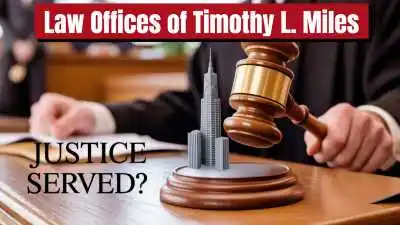LAW OFFICES OF TIMOTHY L. MILES
TIMOTHY L. MILES
(855) TIM-M-LAW (855-846-6529)
[email protected]
(24/7/365)

A securities class action lawsuit can evolve into investigations into the board of directors for breaches of fiduciary duty and other violations of law are critical in maintaining corporate governance standards and protecting shareholder interests. Fiduciary duty refers to the obligation of the board members to act in the best interests of the company and its shareholders, prioritizing their needs above personal gain.
When these duties are breached, it can lead to significant financial losses, reputational damage, and erosion of shareholder trust and the filing of a shareholder derivative lawsuit. Such investigations often uncover unethical practices, conflicts of interest, or fraudulent activities that compromise the integrity of the company. Shareholders may respond by initiating a securities class action lawsuit or a shareholder derivative lawsuit to seek redress and hold the responsible parties accountable.
A securities class action lawsuit is a legal mechanism that allows a group of shareholders to collectively sue the board of directors for violations such as misrepresentation, insider trading, or other fraudulent activities that adversely affect the value of their investments. This type of lawsuit aims to recover damages on behalf of all affected shareholders.
On the other hand, a shareholder derivative lawsuit is a lawsuit brought by shareholders on behalf of the corporation against third parties, typically insiders like directors or officers, who have allegedly harmed the company through their actions. Both legal avenues play an essential role in enforcing corporate accountability and deterring future misconduct.
The outcomes of these investigations and lawsuits are significant for maintaining market integrity and investor confidence. They can result in monetary compensation for shareholders, changes in corporate governance practices, or even the removal of culpable board members. By holding directors accountable for their actions and ensuring adherence to fiduciary duties, these legal processes help safeguard the interests of shareholders and contribute to the overall health and stability of the financial markets.

The fiduciary duties of a board of directors encompass a set of legal and ethical obligations that the board members owe to the corporation and its shareholders. These duties are primarily categorized into the duty of care, duty of loyalty, and duty of obedience. The duty of care requires directors to make informed decisions with diligence and prudence, ensuring that they act in the best interests of the corporation.
When they fail at these duties it can cause signficant harm to the company such as wasted corporte assets, increased legal costs, and other damges that a shareholder derivative lawsuit can recover on behalf of the company.
The duty of loyalty mandates that directors prioritize the corporation’s interests above their own, avoiding conflicts of interest and self-dealing. The duty of obedience obliges directors to ensure that the corporation operates within the bounds of the law and adheres to its charter and bylaws.
A breach of fiduciary duty can lead to significant consequences for both the directors and the corporation including a shareholder fiing a shareholder derivative lawsuit. Such breaches occur when directors fail to fulfill their obligations, resulting in harm to the corporation or its shareholders. Common examples include making decisions without adequate information, engaging in transactions that benefit personal interests over those of the corporation, or failing to comply with legal and regulatory requirements.
When a breach is suspected, litigation investigations may be initiated to determine whether the directors acted inappropriately. These investigations can be time-consuming and costly, potentially leading to legal action against the directors and damaging the corporation’s reputation. To mitigate the risk of a breach of fiduciary duty, boards should implement robust governance practices, including regular training for directors on their responsibilities, thorough documentation of decision-making processes, and periodic reviews of compliance with legal and ethical standards.
Furthermore, engaging independent advisors can provide an objective perspective and ensure that decisions are made with the utmost integrity. By adhering to these practices, boards can uphold their fiduciary duties, protect the interests of their stakeholders, and maintain trust in their leadership.
When they fail to adhere to these practices commit a breach of fiduciary duty, a shareholder can step into the shoes of the corporation and file a shareholder derivative lawsuit to recoup the damages inflicted on the company.

A breach of fiduciary duty by a company’s board of directors can have severe repercussions for the organization. Fiduciary duty requires board members to act in the best interests of the company and its shareholders, maintaining loyalty, care, and good faith in their decisions.
When a breach occurs, it can lead to significant financial damage, tarnished reputations, and loss of shareholder trust. Litigation investigations often follow such breaches, consuming substantial resources and time, in addition to subjecting the company to a class action lawsuit.
These legal battles not only incur direct costs but also divert the attention of key personnel from essential business operations particulary when there actions cause them to have to spend corporate funds to defend themselves in a class action lawsuit or derivative lawssuit.
Moreover, the impact of a breach of fiduciary duty extends beyond immediate financial losses. The company’s market value can plummet as investor confidence dwindles, leading to a decline in stock prices. This erosion of trust can also influence future investment opportunities and strategic partnerships, as potential investors and partners may view the company as a risky or unreliable entity.
The internal morale among employees can suffer as well, resulting in decreased productivity and increased turnover rates. In cases where litigation investigations reveal egregious misconduct or negligence, regulatory bodies might impose hefty fines or other penalties. Such actions further strain the company’s financial stability and can necessitate extensive restructuring efforts to comply with regulatory mandates.
Additionally, the publicity surrounding these events can generate negative media coverage, amplifying the damage to the company’s public image. Ultimately, a breach of fiduciary duty by the board undermines the foundational principles of corporate governance.
To mitigate these risks, it is crucial for companies to implement robust oversight mechanisms and ensure that board members are adequately informed about their responsibilities and the potential consequences of their actions. This proactive approach can help safeguard the company’s integrity and long-term success.

Shareholder derivative actions are a critical legal mechanism that can be employed to address and recover damages incurred by a company due to a breach of fiduciary duty by its executives or directors.
When corporate leaders fail to act in the best interests of the shareholders or the company, resulting in financial harm, these actions provide a pathway for shareholders to seek redress.
Unlike a class action lawsuit, which involves a group of plaintiffs suing for personal damages, a shareholder derivative lawsuit is brought by shareholders on behalf of the corporation itself. The primary goal is to hold the wrongdoers accountable and to restore the company’s financial health, rather than seeking individual compensation.
In cases of a breach of fiduciary duty, it is imperative for shareholders to demonstrate that the actions of the executives or directors were not aligned with their legal obligations to act loyally and in good faith towards the company. Such breaches can take various forms, including self-dealing, misappropriation of corporate assets, or gross mismanagement.
By pursuing a shareholder derivative action, shareholders aim to rectify the wrongdoing and ensure that any financial losses suffered by the company are recovered. This legal remedy reinforces the importance of fiduciary duties and serves as a deterrent against future misconduct by corporate leaders.
Moreover, a shareholder derivative lawsuit plays a vital role in corporate governance by enhancing transparency and accountability within the organization. They empower shareholders to take an active role in safeguarding their investments and promoting ethical conduct at the executive level. While these actions can be complex and protracted, they underscore the significance of adherence to fiduciary duties and the potential consequences of failing to do so.
Ultimately, through s shareholder derivative lawsuit, companies can recover damages and reinforce their commitment to ethical business practices, thereby fostering long-term trust and stability in the corporate environment.

It is impossible to overstate the importance of rigorous litgation investigations and lawsuits in maintaining the integrity and trustworthiness of financial markets and, in turn, investor confidence. When regulatory bodies like the SEC investigate and prosecute instances of market manipulation, fraud, or insider trading, they send a clear message that such unethical and illegal behavior will not be tolerated.
This unwavering commitment to enforcement not only holds wrongdoers accountable but also acts as a powerful deterrent, discouraging others from engaging in similar activities. Without strong oversight and the ability for investors to seek redress through legal channels when they or the company they are invested in are harmed, the essential element of trust in the fairness and transparency of the markets erodes.
This erosion of trust can have far-reaching consequences, potentially leading to reduced investor participation, decreased liquidity, diminished economic growth, and even impacting businesses’ ability to access vital financing.
Therefore, the continued dedication to robust investigations and effective legal processes is paramount to fostering a healthy and vibrant financial ecosystem that benefits all participants.

The conclusion of litigation investigations, particularly regarding a board committing a breach of fiduciary duty, is a critical juncture for holding leadership accountable and shaping future corporate behaviorin corporate governance and legal processes. When a board of directors is found to have breached their fiduciary duties, it signifies a failure to act in the best interests of the shareholders and the company. Such breaches can lead to significant legal repercussions, including class action lawsuits.
These lawsuits are often initiated by shareholders who have suffered financial losses due to the board’s misconduct, or the company they are invested in has been damaged. The resolution of these investigations typically involves extensive legal scrutiny, potential settlements, or court rulings that can mandate changes in corporate governance practices. Ensuring accountability and transparency within the board is essential to restoring stakeholder trust and maintaining the integrity of corporate operations. As such, companies must diligently adhere to fiduciary responsibilities and implement robust oversight mechanisms to prevent future breaches.
We hope you find the litigation investigations posts below helpful, and if you are a shareholder of a company that its board has commited breaches of duty or other violations of law, contact us today for a free case evaluation.
Timothy L. Miles, Esq.
Law Offices of Timothy L. Miles
Tapestry at Brentwood Town Center
300 Centerview Dr. #247
Mailbox #1091
Brentwood,TN 37027
Phone: (855) Tim-MLaw (855-846-6529)
Email: [email protected]
Website: www.classactionlawyertn.com